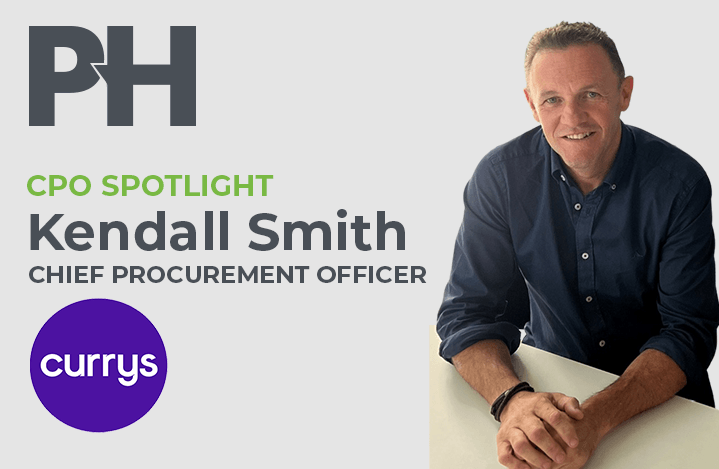Tell us about your role
I am the Chief Procurement Officer, which means that I am responsible for the procurement of everything that we don’t sell in stores or online, so everything non-product. Our spend is predominantly on Supply Chain Services, IT, Marketing and Corporate Services as well as a number of significant outsourcing deals.
What did you inherit in the role when you started?
I was brought in after the new CFO had identified that we weren’t getting value out of our approach to the procurement of what in Retail is called “Goods not for resale”.
My role was to professionalise the team, work out where cost savings could be made and put a plan in place to deliver on that.
The first thing I did was to strengthen the management of the procurement team. They had already made some really good hires so that gave me a great starting point. I reorganised the team to align to our main spend areas of IT, Corporate Services etc and added some strength to the management team.
I explained how I wanted the team to engage and understand each part of the business, work out what their objectives were, how they were spending their money and to agree a plan of where we could work with them to deliver savings for the company.
In my first year, I was given a target of taking £30m out of the bottom line. The savings pipeline was limited, so this was one of the things we had to address through engagement with business owners and finance.
We also had to give the business a better understanding of the role procurement performs, how we wanted to work with them going forward, and then agree an annual plan of activities to carry out.
What does procurement mean to you and Currys?
My philosophy has always been to align procurement to the business and to try to make the team as proactive as possible. I want a team that understands the different approaches to saving money – tendering, negotiating, value engineering – and to be able to use their judgement and experience to choose the right approach at the right time.
Our business has been going through a massive transformation, and our role is to identify where we can save money to help fund the changes that need to be made. It’s therefore very easy for the team to see the value they are delivering to the company.
Has your journey over the last three years made procurement’s role in the business a lot clearer?
I hope so!
We have much better engagement now although there’s always room for improvement.
While we aim for proactive discussion and engagement with the business, we also have full support from the Finance community to ensure that we are involved in every significant purchase. For example, nothing gets spent over £100,000 without approval from our Investment Committee, which I sit on. All consulting projects also must go through the Investment Committee.
This means I get sight of everything before it can be approved. So, there is a safeguard to make sure we are involved. We are also engaged in all transformation projects.
What are you most passionate about having done at Currys?
Building the team and having greater visibility internally. I wanted the company to know that we have a great procurement team!
So, I talked to the team about making sure that we make that known, so the function has greater respect from the business.
My biggest passion is to continue to build the strength of the team and make sure we can attract, retain, and develop people in the business. We are looking for rounded commercial people who can be adaptable.
We are a small team so we have to be quite innovative in how we give people different opportunities.
The initial £30m of savings we made soon increased to a £100m saving that had to be delivered over three years. That meant questioning absolutely everything we spend money on and finding a way to get better value.
You start with your standard sourcing approaches but pretty quickly we looked at how we actually buy things, and whether we should buy them in the first place.
Consequently, we have been involved in at least three very large outsourcing deals and even got involved in the project to look at how our Office environment should look post covid which resulted in our recently announced move to a WeWork office in Waterloo.
That project started as a request to buy furniture to refit our office in Acton. As a result of our participation, the business was able to consider a move to a new WeWork office, funded by savings made elsewhere in the business. That’s probably the deal I’m most proud of. It wasn’t just about the cost angle, it was about improving the colleague experience, making the company a more attractive and suitable place for people to work.
You have always been very focused on the people and giving them opportunities, is that something you have brought to Currys?
Yes, I hate being told what to do! I take the view that if I was told by my boss what to do and how to do it, that would be my least favourite scenario and so I try to make sure I give the team the freedom to come up with their own ideas and plans.
I truly believe in hiring great people, telling them what we want to achieve, and giving them freedom so they can come up with their own plans to achieve the objectives. My role is then to give them guidance to help them be successful.
You really have to give people the opportunity to take on new things. That’s how one of the team took on a new airport stores project. It was a bit of a risk as he hadn’t done that type of project before, but actually giving someone the opportunity to have a look and come up with ideas himself really delivered for the business.
What do you think is going to keep your team busy over the coming years?
We are discussing this and working through it right now. What do the next three years look like for the function? The first three years were about building the function, the operating model and delivering as we went. We have made significant progress in that time. There is more to go for but now it does get much harder. We still have to execute on our savings plans, but we have to think about the extra value we can bring to Currys.
Clearly, improving the way we manage our suppliers is at the forefront of that. We definitely have some bigger, deeper relationships now than we have had in the past, particularly with some of the outsource providers we are now partnering with. So making sure we do that effectively so we can maximise the value in the relationship for both parties is going to be critical.
Managing Supplier Risk and driving the CSR agenda is very big for Currys, and so it’s critical we engage and manage our supplier relationships well. There are lots of things we can do from a procurement perspective.
We have got a very clear set of strategic business priorities within Currys, so it is about making sure we align our activities against them. That way we will continue to be a successful function and make a real difference to Currys and the bottom line.






